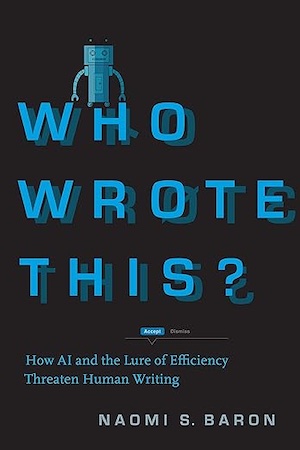By Kyra Arena
In a world where words have dominated the realm of human creativity and intellect, a quiet revolution is unfolding, one that challenges our very notion of authorship. Have you ever found yourself engrossed in a novel, only to discover that it wasn’t written by a human, but rather by artificial intelligence? Distinguished linguist, professor, and author Naomi S. Baron (ΦBK, Brandeis University) addressed these topics in her recent book Who Wrote This?: How AI and the Lure of Efficiency Threaten Human Writing, published this fall by Stanford University Press.
Baron is noted for studying the effects of communication media. For more than 30 years she has been investigating how technology shapes the way humans speak, read, write, and think. “Several years ago, colleagues and I surveyed university and secondary school students on their perceptions and practices regarding reading in print versus digitally,” she explained. “My current work on artificial intelligence as an author and editor is the culmination of an even longer fascination both with AI and with writing as a form of linguistic representation distinct from speech.” Some of Baron’s previous titles include How We Read Now: Strategic Choices for Print, Screen, and Audio (2021), Words Onscreen: The Fate of Reading in a Digital World (2015), and Always On: Language in an Online and Mobile World (2008).
Who Wrote This? is her tenth book. In it, she delves into such questions as why we write and what writing does to our minds. “As we cede increasingly more of our writing to generative AI, we risk losing out on the power of writing to clarify our thinking and to express ourselves in our own voice,” Baron said. Her main concern is that as more of these AI tools infiltrate writing spaces, the fewer writing skills people will retain. She said that “the result will be decreased benefits from the cognitive and personal rewards of doing our own writing.”

The book serves as a testament to the ever-evolving dynamics of language, technology, and human expression. As AI continues to reshape the landscape of writing, Baron’s work stands as a reminder of the importance of preserving individual writing skills and the fundamental benefits they offer to our lives.
Baron, a Professor of Linguistics in the Department of World Languages and Cultures at American University until her retirement in 2018, received her PhD in Linguistics from Stanford University and obtained a BA in English and American Literature from Brandeis University.
Prior to her tenure at American University, Baron taught at Brown University, the Rhode Island School of Design, Emory University, and Southwestern University. She was a Guggenheim Fellow, Fulbright Fellow, and was inducted into Phi Beta Kappa at Brandeis in 1968. In fact, during Baron’s early years at American University she helped to orchestrate the school’s ΦBK chapter application, which she described as an honor. The Zeta of the District of Columbia chapter was established there in 1994.
Phi Beta Kappa and its values have been an important part of Baron’s work and life. “Most recently, in crafting Who Wrote This?, I recognized how the diversity of threads I was weaving together was enabled by the breadth of inquiry I had engaged in over the decades,” she said. “This breadth was driven by the liberal arts perspective that Phi Beta Kappa so fiercely champions.”
Beyond her impressive credentials, Naomi S. Baron’s work has had a wide public impact. Her inquisitiveness has paved the way for critical discussions surrounding the transformative influence of technology on human language and communication, as she has appeared in such media as Good Morning America, the ABC News program 20/20, CNN, The Diane Rehm Show, All Things Considered, the BBC, The New York Times, The Wall Street Journal, The Washington Post, The Chronicle of Higher Education, The New Yorker, Fortune, and Time.
Who Wrote This? and Baron’s other work have received praise from multiple sources. Read more about her accomplishments on her American University website.
Kyra Arena is a graduate student studying curriculum and instruction at the University of Connecticut, where she also obtained her Bachelor of Arts in English and Bachelor of Science in English Education. She was proudly inducted into Phi Beta Kappa there in May 2023. The University of Connecticut is home to the Epsilon of Connecticut chapter of Phi Beta Kappa.




